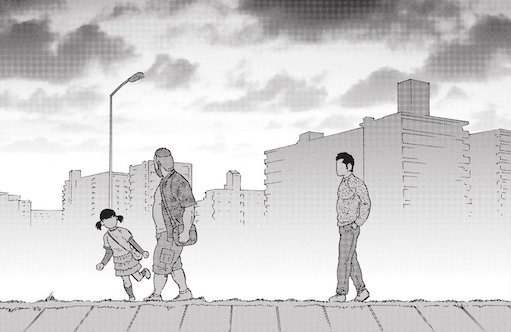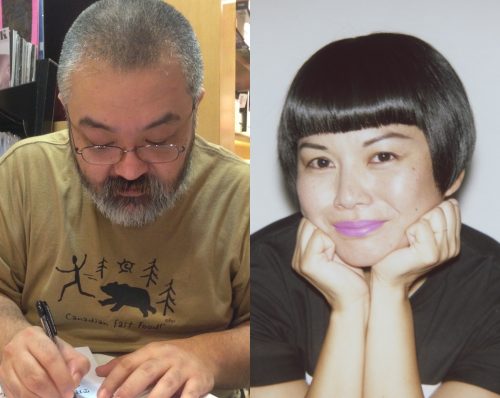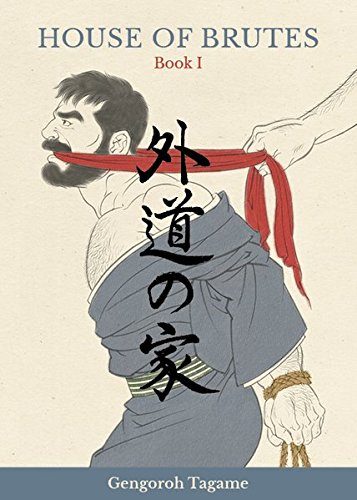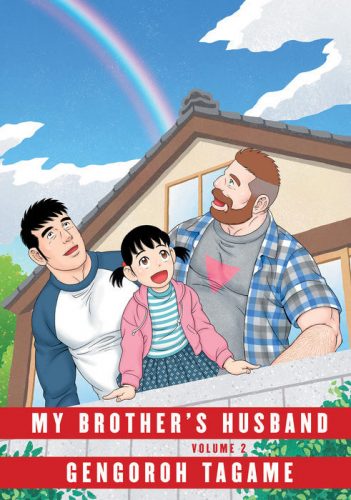Influential Manga Artist Gengoroh Tagame on Upending Traditional Japanese Culture

Author: Edit Team
December 19, 2018
Gengoroh Tagame and I have a working relationship that began as a favor for graphic designer Chip Kidd. I’d been doing translation work with Chip on Bat-Manga when he told me how obsessed he’d become with Tagame. Chip asked if I could help him translate some of Tagame’s work for him personally, and if I thought it was possible to get in touch with him about working together somehow. When Chip then showed me Tagame’s work—a photocopy of Do You Remember the South Island P.O.W. Camp—I was gobsmacked. Not only was the work exhilarating, challenging, exciting; the draftsmanship exquisite, and the storytelling so sophisticated (and I’ll say it… “sophisticated for porn”), I was also just flattered that anyone of Chip’s stature would share with me (at the time, still an early-career publicist) such a glaring and glancing corner of their sexual id. Meanwhile, Chip claims I was obviously a safe receptacle for his Tagame collection if my “insane emails” were any indication.
Over ten years later, Chip and I (along with Graham Kolbeins) continue to work closely together on bringing the magic of Gengoroh Tagame to Anglophone readers, whether it’s his hard-core gay erotic BDSM comics and illustrations, or works like My Brother’s Husband, his all-ages manga set in suburbia, where sex is a suggestion and not a visceral violence extrapolated upon through exhaustive iterations of power and desire.
Tagame and I are sitting in a packed business-class car of an Amtrak regional train to Philadelphia from New York when I conduct this interview, and it should be noted for the record that we’re speaking in Japanese. This fact does not fully occur to me until I transcribe the interview from an audio recording where I hear every other conversation within two seats of us. I have to assume no one else understands Japanese because there’s still something so sacred about talking about Tagame’s work in public, and that is what makes that work so magical.
–Anne Ishii
Anne Ishii: As you know, I’m recording this conversation for the Lambda Literary that also nominated My Brother’s Husband for its annual award this year.
Gengoroh Tagame: Oh yes. Actually, I was reading up on Lambda when the nomination was first announced, but I have to admit I’d misunderstood what I’d read and thought they were the Lambada Foundation and that I was up for a Lambada Award.

Gengoroh Tagame and Anne Ishii
AI: I love that! You deserve a Lambada!
GT: Anyway, I realize that it’s a very established organization with a legacy. Not the Lambada.
AI: We’ve been working together in the capacity of translator and writer, writer and agent, for several years now, and as your translator, and not that I mind or that you mind, but of course, I do feel like we get asked a lot of the same questions. I wonder if there’s anything you find curious about what’s not being asked. Are there questions you wish people would ask you? Whether it’s something thematic or a specific issue, do you wonder whether people are curious about anything un-asked?
GT: I don’t get asked a lot about specific details about scenes, but I do get asked a lot about what motivated me to start my career. And that’s fine. But if for example, people had more impressions about specific scenes…or asked about specific details, I think that could be interesting.
AI: So then I’ll jump right into the details, but with My Brother’s Husband, I recall you had done a ton of photo reference research, and at one point we were in Saitama visiting Mr. Ogizaki (who runs a private gay art museum and library out of his apartment) and you were taking pictures of really pretty plain suburban landscapes.
GT: I did take a lot of reference pictures. Actually what’s funny is how I ended up having to research the onsen scene in My Brother’s Husband. I decided to stage that chapter in Hakone because it’s near Tokyo and I’ve been there a lot. But I had to get some reference photos and only had like a month till my deadline. Right before my scheduled research trip, an active volcano in the area started smoking and the area was suddenly off limits, so I had to cancel my trip. I couldn’t take any pictures of the railway or route in time for my file date so I asked (my publisher) Futabasha to send me any pictures of Hakone they might have in-house; personal vacation pictures or whatever. They in turn sent this request out to their entire editorial staff, and a bunch of editors mined their personal pictures for shots of Hakone. So suddenly I have like 100 pictures from Hakone, but like, family pictures of spouses and children. If you look in my computer right now, there’s a folder called Hakone that’s all pictures of strangers I don’t know. [Laughter]
AI: The rest of your computer is probably filled with albums of smut.
GT: Exactly! [Laughter] I was really anxious about having it in my computer and thought, “I should really delete these…”
AI: I like the idea of Futabasha staff, conversely, having a folder called Hakone that’s just hard-core porn.
People might not appreciate this, but you actually work from home out of a private bedroom. I know working from home is nice, but have you not ever thought of taking on a studio and assistant to start a formal practice, or is it better to work alone, after all?
GT: I prefer to work alone, for sure. I don’t ever think about getting a studio and assistant, but I do think often that it’d be nice to live somewhere where my workspace is more compartmentalized than it is currently. I currently live in a 2 bedroom apartment, where my partner and I each have our own room. I’d love a 3 bedroom. The third room would be my work studio. But at the time we found our apartment, a 3 bedroom would have been a “Families Only” apartment. If we were a straight couple, we could get a 3BR with the eventuality of filling out the third room.
AI: That’s housing discrimination.
GT: Yes, absolutely. At the time, our housing search was kind of an ordeal. It was difficult enough finding a 2 bedroom with him. When non-couples are looking for housing, you are really just looking at student housing shares and small 1 bedrooms, and otherwise “friends ok” type rooms, but an apartment with many rooms was principally “Families Only.”
AI: In America, well…no, at least in New York, I feel like that kind of (discrimination against non-family renters) would be unheard of, if only because real estate agents just want the money and won’t care if you can afford it.
GT: That’s an area where Japan is still definitely very conservative. Also, when it comes to renting to foreigners. Apparently that is really difficult too […] When we looked for an apartment, we were at one point resigned to the possibility we might just have to settle for being neighbors. We almost gave up but then finally found the place we’ve been in for upwards of 12 years now. To be fair, things are a little more flexible now and Setagaya-ku (the ward of Tokyo where Tagame-san lives) has also started to recognize same-sex partnerships, so.
If we get that status, things like housing applications will go a little more smoothly.
AI: Given how frustrated you are with Japanese traditionalism, what do you think appeals to you about it? Your earlier work, for example, is really pretty grounded in that traditional ethos, and here I’m thinking of how you exploit Japanese traditional aesthetics in tomes like The Silver Flower or House of Brutes.
 GT: Hmmmm. This is a little complex but excluding My Brother’s Husband, I’m an S&M author, right? Which means that in the S&M context, I’m fascinated by how these hierarchies fail. Looking at a patriarchal society like Japan, where men and fathers have the ultimate authority, where fathers and men are considered symbols of strength–whatever Japanese people may think, it’s been that way in Western history too.
GT: Hmmmm. This is a little complex but excluding My Brother’s Husband, I’m an S&M author, right? Which means that in the S&M context, I’m fascinated by how these hierarchies fail. Looking at a patriarchal society like Japan, where men and fathers have the ultimate authority, where fathers and men are considered symbols of strength–whatever Japanese people may think, it’s been that way in Western history too.
AI: Like “danson jyohi” (an antiquated Japanese aphorism that literally translates to “raise men, diminish women”).
GT: Right, exactly. So in that context, I’m interested in how men are perceived as manly, how they respond to societal pressure and whether they are good or bad, how they have to perform their manliness beyond what’s necessary. It’s not unlike the concept of “machismo” in Europe or Latin American culture; just a little different. So imagine in that context, if a man loses his manliness, for example, by being subsumed anally, or by participating in activity that normative society believes men would not normally participate in…what it would be like to make him participate.
Falling from hierarchy is the ultimate act of sadomasochism. I find the Japanese ideas of beauty and tradition unappealing conceptually, but as an element of fiction, I feel extraordinary Eros in the destruction of those principles.
AI: I don’t know exactly how to ask this question, but the anal violation you depict…Well, as a woman, the act of being taken or dominated and the assumption of a passive stance in my role in an act of intercourse, whether it’s pleasurable or not, is a universally “feminine” or un-manly act, and in what you’re describing, there’d be inherent shame in that.
GT: Like bottom-shaming.
AI: Exactly. But I feel like these past 10-20 years, that standard or assumption has really turned around. What do you think?
GT: I totally agree. Truly.
AI: What do you think of that reversal?
GT: I think it’s great, actually. Something I think that’s funny about gay Japanese culture is that there’s this phenomenon, when a guy is being extra mannish, they’re “ora ora kei” (ora-ora translates loosely as “oi” like a hooligan chant, and kei means “in the style of” so “ora ora kei” is like “in the oi-style”).
What’s funny is at some point people started referring to themselves as “ora neko” (neko means bottom, so an oi bottom). [Laughter] Like a bottom being all macho about getting topped. “Oi! Top me!” Thus taking the stigma out of being a bottom or a neko completely. And I find that so fun.
AI: [Laughing] So in an age when, well…in the age of an empowered bottom, do you think you can still exploit the concept of a passive bottom or the shame of being anally subsumed, such as characters are in House of Brutes?
GT: Oh sure. I mean it will become harder to understand. Like, some bottoms might ask, “why is this necessarily shameful?” And in the context of BDSM, a man being subsumed is a humiliation, but if you’ve never experienced that as humiliation then sure, you will wonder what it means. But I still think there’s an interesting power dynamic there. In my book Endless Game, for example, you have a main character who is taken as a sex slave but enjoys taking it so much that his captors are now the ones having to respond to his desire.
[At this point, several new train passengers board and ask an Amtrak employee where they can sit. We lower our voices.]
AI: Actually, that’s a great example of exactly this empowered bottom. At the time that I was translating this, I thought to myself that the main character of Endless Game was a complete psycho. More psychotic than your typical Tagame aggressor/villain.
GT: You know, something came up recently in conversation that I think is interesting, though I don’t know if you can use it in this interview…when I read Tumblr, I see that “politically incorrect fantasies” are a thing. [Editors’ Note: This interview was conducted before Tumblr’s porn ban.] For example, being called a fag by straight men, or and this one really shocked me, but fantasies of contracting HIV. I think on platforms like Tumblr that are so good at protecting anonymity, anything goes…expressions that would absolutely not be tolerated above ground can thrive underground. When I see that happening, sexual fantasies in the realm of the unethical published even in a liberal social environment…I find that in itself sort of interesting. I can look at this from the point of view of it being sexual fantasy, but if these ideas go beyond sexual fantasy and manifest as true social causes, I think we’re looking at something extremely dangerous.
In that sense, whatever I depict, it will always only ever be art (illustration). There’s no way it can be interpreted as realism. There’s an advantage to interpretation there.
AI: So this theme—people who hate each other in the beginning turn out to actually like each other very much—is very common in American romantic comedies, but it’s one I’ve never personally related to. How would you say you relate to it? How would you make sense of that in realistic terms, if we were being realistic?
GT: Hmmm…I think personally, I too, have not actually had that kind of tension with someone—hating them and then realizing I actually like them. But! I certainly see that some people lack any human quality I would ever validate or appreciate, and still think they have enormous sex appeal.
AI: Oh my god. Yes. Not to make it weird, but after the 2016 Presidential election I started having really vivid sexual fantasies with Trump supporters. I interpreted this as a sign of hope at the time. [Laughter] Like, sex could transform them into good people.
GT: [Laughing] There’s something animal about that thinking. I think writing pornography about situations like this appeals to me because it makes my fantasies safe for consumption. If I really wanted to get fucked by a straight homophobe, reading about it would make me feel a lot better than making it happen.
AI: What’s beautiful about pornography is that you can get so much out of just one’s imagination. I mean as a consumer of it.
GT: Exactly.

AI: I want to end on a fun note–we’ve been joking this week about Chris Pratt being cast in an adaptation of My Brother’s Husband, but in all seriousness, what do you think of a movie or television adaptation in America? […] Television seems like a great platform for the story because there’s an opportunity for never-ending stories with each of the characters and themes of My Brother’s Husband.
GT: Yeah, actually I’ve toyed with the idea of several spin-offs. One that’s interested Futabasha is my telling the backstory of Ryoji while he’s alive; before going to Canada. But when Futabasha said they could be interested, I was like, “great, so just pay for me to live in Toronto for six months and do the research.” [Laughter] Of course they said no.
AI: [Laughter] Yeah if you pitch them again tell them to send me with you.
GT: But a spin-off is still a possibility!
AI: You could write your own fan fiction.
GT: That’s it, right. I mean it could literally just be that conceit of “stick a bunch of my characters in a coffee shop.” Hahaha.
AI: Who would be in your fan fiction coffee shop scene?
GT: Hmmm…from a fan fiction perspective, maybe the characters from Do You Remember the South Island POW Camp, end up in this cute cafe and have a super normal date, instead of ending in a brutal and tragic denouement after a prolonged master-slave dynamic during war time.
Featured image: interior art from My Brother’s Husband, Volume 2. Photo of Gengoroh Tagame by TarValanion via Wikipedia; photo of Anne Ishii by Lucas Michael.

